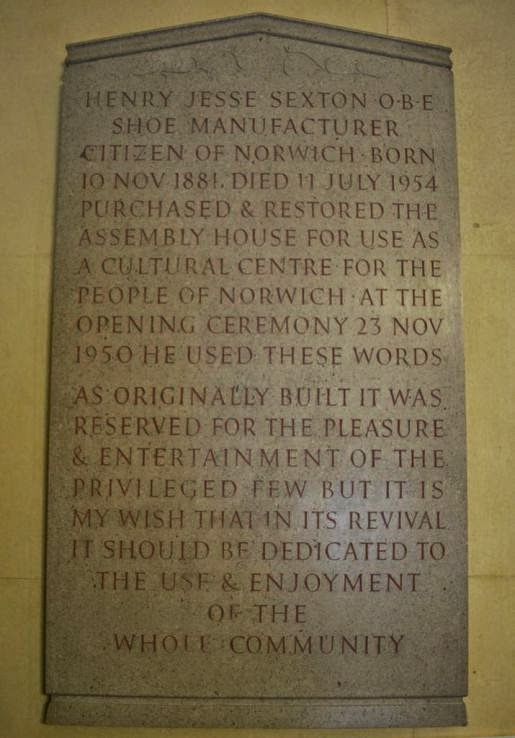 |
| Henry Jesse Sexton - a Norfolk hero? |
Today, History Club members did a session which I thought was fascinating in so many ways. My role was to facilitate a discussion about people we consider to have made a real contribution to Norfolk life. I began by explaining why group activities like this are such an important part of the Norwich Community History Club.
Just as we encourage members to meet and mix in St Stephen's Church cafe in order to connect with others, so our group activities serve an important part in connecting us with each other. Furthermore, through the ensuing discussions members' become active in discovering their history. It activates us and helps us to be curious and keep learning. The insights, ideas and questions of the members are treated with respect and valued, as we have 'history in our heads' - and that is valid and important to us.
Having outlined this the members discussed their hero(ine)s in their groups. It was clear that, for some people, this proved to be challenging initially. There was, I think, a bit of 'blank page' syndrome going around. However, after a while the discussion 'warmed up' a bit and it proved to be fascinating.
Unsurprisingly, one of the names that was mentioned in several groups was Admiral Horatio Nelson, the great British naval hero and son of Norfolk. However, in the course of the wider discussion one member voiced the opinion that Nelson was more properly associated with Portsmouth than Norfolk. It was suggested that his adoption on the road signage of Norfolk was more about place marketing than any real contribution made by Nelson to the county. This is an interesting perspective and forms the basis of a discussion I would like us to return to at some point.
At one point, Clare Agate, the Community Librarian who helps make us feel so welcome at the Millennium Library every week, left her group returning with an armful of books (as a librarian should!). In particular, with a copy of 'Moving Miles' in hand, she wanted to highlight the work done by Nigel and Jennifer Ford in recognising and restoring the historic milestones of Norfolk to their former glory (see HERE for further details). Feeding back during the discussion, Clare said that, for her, these 'ordinary' folk had made an extraordinary contribution to the county's heritage. In addition, Clare's group noted the case for Jeremiah Coleman (social reformer and philanthropist), Elizabeth Fry (prison reformer), Alan Bloom (horticulturalist and founder of Bressingham Steam Museum), Sir George Edwardes (early trade union organiser of Norfolk's rural workers). Another person who was mentioned was Sylvia Haymon, author of 'The Quivering Tree' and other publications about Norfolk life. It was fascinating to hear the reminiscences of one of the members who went to school with Sylvia and who treasures her copies of her work. During this discussion, I mentioned Edith Cavell, whose story members know very well now following the brilliant sessions we've done with Nick Miller. It is extraordinary that, facing imminent execution at the hands of the German military authorities in 1915, she was able to find the generosity of spirit to speak these famous words:
"... standing as I do in view of God and eternity, I realise that patriotism is not enough. I must have no hatred or bitterness towards anyone."
On another table the discussion had a different emphasis. This group reflected upon those people who worked to preserve our historic buildings for posterity. These included Augustine Steward, who in the sixteenth century helped to save the former Dominican friary (now Blackfriars/St Andrew's Hall), together with those solid citizens who donated museums to the people of Norwich (Sir Henry Holmes, Museum of Norwich at the Bridewell; Leonard Bolinbroke, Strangers Hall). I was also reminded of the contribution of Henry Sexton who donated the wonderful Assembly House as a cultural centre for the people of Norwich (see the plaque dedicated to him, pictured above). As we considered these benefactors and their contributions we remembered the excellent work of The Norwich Society, as well as the bequests of the wealthy merchants of Norwich which, via the work of the Norwich Charitable Trusts, continue to benefit people on low incomes in Norwich to this day.
Club treasurer, Andrew, made a case for the architect, Henry Bell, to be cited as a hero for designing the amazing Customs House in King's Lynn, pictured here...
 |
| Customs House, Kings Lynn [source: King's Lynn Online) |
Finally, this fascinating discussion also focused on people who quietly contribute to their county and community. One such person is Geoff Roberts, founder of 'The Flying Folk Club', which has, for the past twenty five years, been meeting at different pubs across Norfolk. This club brings people together to sing folk songs and to socialise. Maggie, who nominated Jeff, painted an affectionate portrait of a man who, "is great at bringing people together... and improving their wellbeing." In a similar vein, Jill mentioned Emily Faith Marsh, who up until her death earlier this year, was a much loved and widely respected resident at Mangay House in Aylsham. Faith (as she was known) was kind and gentle and lived for 32 years in the flats, having retired there aged 63.
Many of those nominated may be people without plaques - so to speak - but it doesn't mean that we shouldn't savour and celebrate them. Within the Norwich Community History Club we will continue to do so!
~ Colin Howey, NCHC Chairperson ~
No comments:
Post a Comment